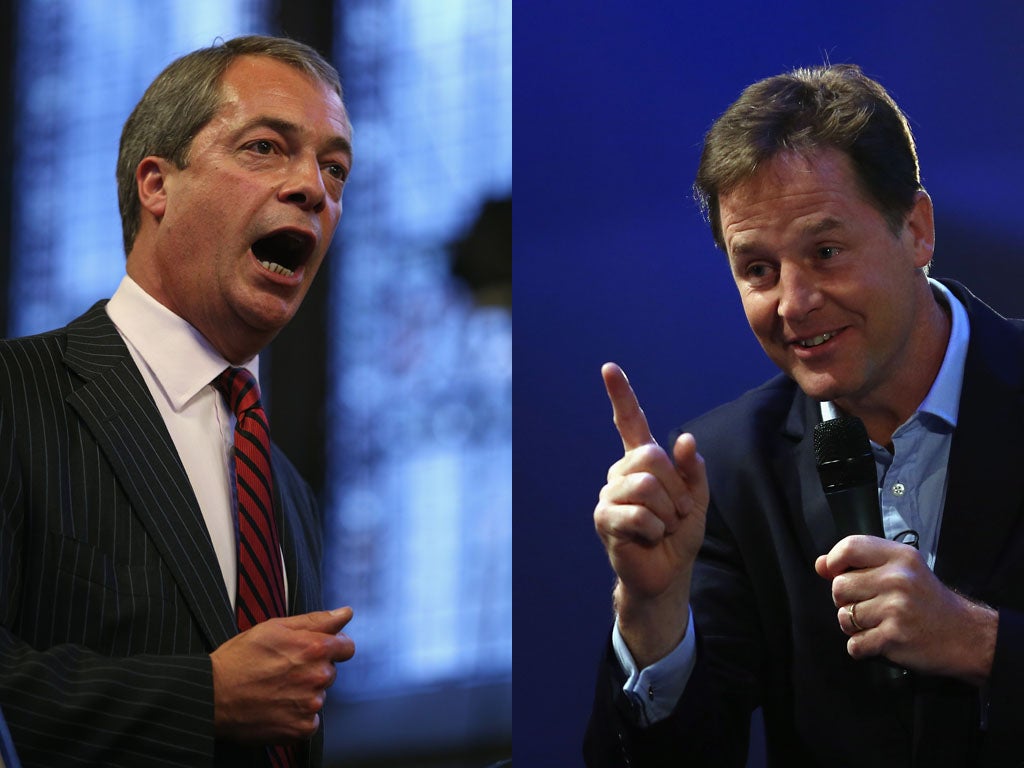Nigel Farage: My live debate with Nick Clegg is upon us. Does he realise what is about to hit him?
I’ve been waiting years for this opportunity, and I won’t be wasting it

There was no way I was going to turn down the opportunity to debate with the Deputy Prime Minister ahead of the European elections. Wednesday night’s event is something I’ve been wanting to happen for years; the bigger surprise is that Mr Clegg took up the challenge. But then his party is facing the prospect of electoral wipe-out at these elections unless they do something drastic. For them, it’s about survival. There is no reason why any establishment party would otherwise want to highlight the huge number of competences which Brussels now has over our lives – especially on a live broadcast and televised debate.
Wednesday evening will be the first time since the 1970s that our membership of the EU has been debated in front of an audience of millions, and unsurprisingly I am excited. For years I have toured towns and villages across the UK addressing public meetings, taking questions from people keen to find out more about Ukip and about the European Union. It wasn’t so long ago that newspaper articles on EU directives which directly affected domestic policy were confined to the foreign-news sections.
I have been told by sources that the Lib Dems are briefing that the debate will go beyond the subject of Europe. Well if you define “Europe” as directives and regulations and turgid clauses debated by committees then I can’t imagine that much of the debate will be about that. To suggest that what we will be debating – immigration, the EU, housing, primary school places, the right to trial by jury and our own sovereign defence and foreign policy – does not come under the heading of a debate on our EU membership is disingenuous of the Lib Dems.
Even back in 1974 the referendum was about whether we wanted to join the then Common Market and be part of a trading bloc. What Nick Clegg and I will be debating in the first round on LBC is whether we want to be either part of political union or a free, self-governing nation. Because at the heart of this debate is the question of identity: are we “European” or “British”?
One of the reasons the Lib Dems have been sinking in the polls is that many people don’t actually know what they stand for. They were a protest vote, telling people what they thought they wanted to hear. But on the issue of the EU, even though they have positioned themselves as the party of “In”, there is still a huge amount for them to clear up.
For there can be no doubt in the minds of anyone but the most deluded Europhile that there are huge problems in the institutions which have failed to sign off their accounts for two decades and which have seen riots in southern European countries as the effects of the disastrous policy of the Eurozone is felt by everyone but those who dreamed it up.
My position is clear, and we have the clear, pragmatic business argument on our side. A few multinationals love the EU because it drives out competition with the costs of compliance and regulation. But the backbone of this country – small and medium-sized businesses – are the ones who are looking towards Ukip’s policy.
But what does Nick Clegg want? And will he tell the country in these debates what reforms he thinks are needed? Or will we still be left guessing what their policy is aside from a desire to cling to an undemocratic and inefficient mode of government?
How naive can the Tories get on the working class?
Lock up your whippets, the Tories are back in town! At least that’s what I imagine Grant Shapps wanted people to think following the “Beer and Bingo Budget” last week. The patronising tweet – which, subscribers and donors, someone was paid to come up with – was clearly designed to try to appeal to older people and the working-class voter who used to support Thatcher.
But aside from the amusing social media meme which resulted, what it really highlighted was that the Tories have no idea of the impact their policies have on ordinary working people. With living standards not expected to reach pre-crash levels until 2018/19 it is a very naive politician who thinks the rest of us will start doffing our flat caps to Tory MPs because of lower tax on bingo and a penny off a pint.
Even Labour has now realised that Ukip take votes from a variety of sources including, in the North, the working class. But unfortunately for Mr Shapps their discontent is not about bingo, it’s about years of policies which have taken a sledgehammer to their way of life.
Anger on immigration is not about benefits, it’s about wage compression, youth unemployment and massive change in communities. And neither the Tories, nor Labour or the Lib Dems, have any genuine answers to that.
Twitter: @Nigel_Farage
Join our commenting forum
Join thought-provoking conversations, follow other Independent readers and see their replies
Comments
Bookmark popover
Removed from bookmarks